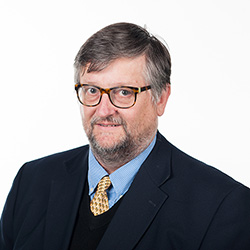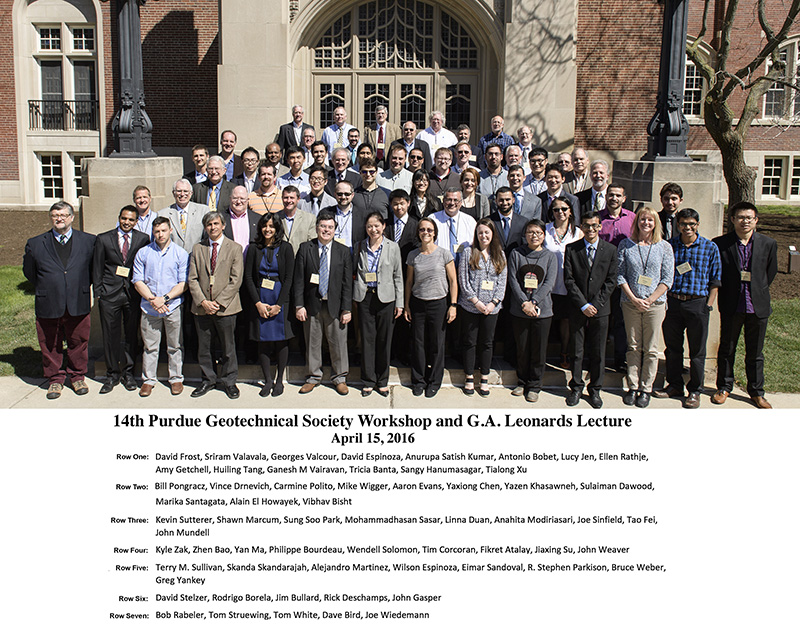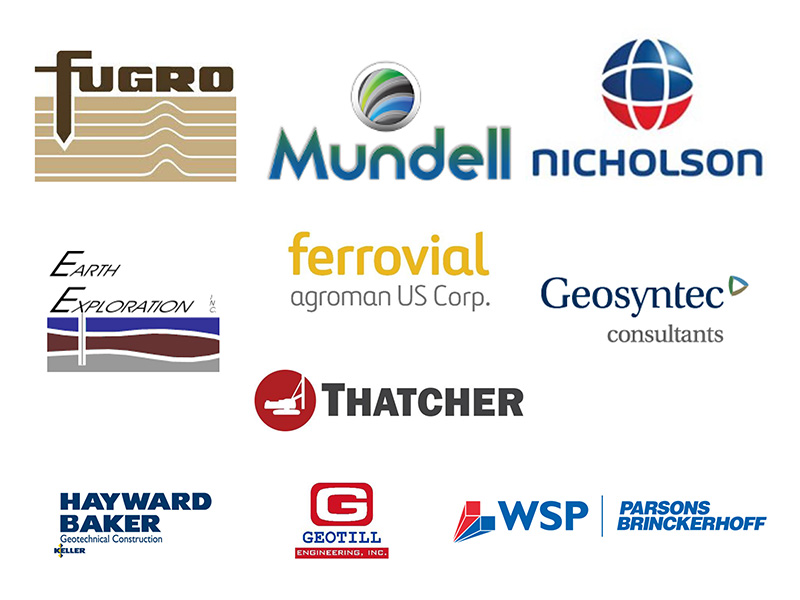2016 PGS Workshop & 14th G.A. Leonards Lecture
April 15, 2016 - 4:30 p.m.
Purdue University, Krannert Auditorium, West Lafayette, IN
The Evolving Role of Information in Failure Investigation
Video of Lecture

J. David Frost, Ph.D., P.E., P.Eng., F.ASCE
Elizabeth and Bill Higginbotham Professor
Georgia Institute of Technology
One of the hallmarks of Jerry Leonards’ career was the manner in which he appreciated the investigation of geotechnical failures as a cornerstone of advancing our profession and yet he recognized, perhaps better than anyone else, the importance of doing so with the same rigor and intent that we use in the design of new structures. The methodology he proposed in the late 1970’s served him and our profession well, but equally importantly, was embedded in the education of generations of students who themselves have gone on to careers in academia and practice and have taken that knowledge and passion with them. Concomitantly, not even the best and brightest amongst those individuals (or for that matter, any individual anywhere in the world) could have predicted the unprecedented ability to collect, analyze and access information that would emerge in the last twenty five years and is continuing even today. This lecture reviews the role of information as it existed when Leonards first proposed his methodology and compares that with the current status to assess the degree to which the methodology can accommodate this influx of information. It will trace, from a general perspective, how information availability has evolved and may be used/abused. At the same time, specific examples of how the role of information in the investigation of geotechnical cases has evolved will be presented and used to highlight some important lessons to be learned as we strive to keep pace with the ever increasing volume of information. A closing assessment will summarize the degree to which the Leonards Failure Investigation Methodology accommodates the evolving status of information quantity and quality.
Introduction by Philippe Bourdeau, Purdue University
Dr. J. David Frost is the Elizabeth and Bill Higginbotham Professor of Civil Engineering at Georgia Tech. He received B.A.I. and B.A. degrees in Civil Engineering and Mathematics, respectively, from Trinity College, Dublin, Ireland in 1980 and M.S. and Ph.D. degrees in Civil Engineering in 1986 and 1989 from Purdue University. Prior to entering academia, he worked in industry in Ireland and Canada on a range of natural resource recovery infrastructure projects ranging from tailings impoundments to artificial sand islands in the Arctic. At Georgia Tech, where he has been for over 20 years, he has served as Head of the Geosystems Engineering Group and as Founding Director of the Georgia Tech Savannah campus. He currently leads the Institute Strategic Planning Advisory Group.
A focus throughout Frost’s career has been the study and analysis of natural and man-made disasters and their impact on subsurface infrastructure. His research is centered on the development and implementation of digital data collection systems for studying subsurface problems related to disasters at multiple scales and he has received two U.S. patents for multi-sensor data collection systems. He has graduated more than 30 PhD students, 40% of whom have gone on to academic positions themselves as well as more than 40 MS students. He has published more than 75 journal articles, an equal number of refereed conference papers and has given more than 80 invited seminars and lectures worldwide. He has edited/co-edited more than 10 conference/workshop proceedings. For more than 25 years, he has served on or led NSF supported post-disaster study teams following earthquakes in US, Turkey, India, China, Chile and Japan as well as at the World Trade Center complex following the 9/11 attacks and he served as a member of the external review board for the NIST report on the Collapse of the World Trade Center Towers. He is a founding member and co-chair of the Geotechnical Extreme Events Reconnaissance (GEER) Association, an NSF sponsored organization that responds to natural and man-made disasters worldwide. He is the resource recovery research Thrust Leader and Co-PI for the recently funded NSF Engineering Research Center on Bio-mediated and Bio-inspired Geotechnics. He has organized numerous workshops and conferences on the applications of spatial analysis tools to study both regional effects and damage patterns from earthquakes and other geo-hazards and well as the micro-scale response of soils under various loading conditions. Most recently, he has been bringing experiences in disaster impacted areas into the classroom and gave a presentation at TEDx Creative Coast on “Ideas Stimulated by Extreme Events”. He is developing a course on International Disaster Reconnaissance for the new Engineering Leadership Minor at Georgia Tech.
Frost has been recognized for his teaching and research, including being a recipient of the ASCE Technical Council on Forensic Engineering Outstanding Paper Award, an NSF National Young Investigator Award, the ASCE Huber Civil Engineering Research Prize, the ASTM International Hogentogler Award and the Georgia Society of Professional Engineers Engineer of the Year in Education Award. He has also been recognized for his efforts in economic development including the Coastal Business & Education Technology Alliance Leadership Innovation Award, the Savannah Science Seminar Science Leadership Award and the Savannah Technical College Community Star Award. Frost is co-founder of a software company that develops digital data collection software and systems with an emphasis on subsurface information.
Presented in conjunction with the 14th Purdue Geotechnical Society Workshop - "Learning From Successes and Failures in Geotechnical Engineering"
2016 Workshop Program | Event photos

Support for the PGS workshop and Leonards lecture is provided by the following sponsors:

